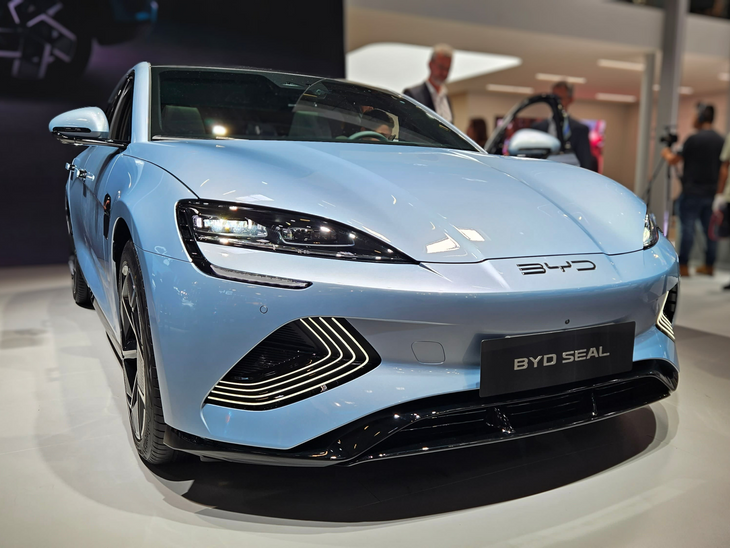India News Get -BusinessMajor automakers like Volkswagen and Mercedes face tough challenges in China
China, the largest automobile market, has created a sensation in the global automobile industry. European companies like Volkswagen, Mercedes-Benz, Aston Martin and BMW are struggling to sell their gasoline and electric cars in China. At the same time, China is increasing the penetration of its cheap electric cars across the world.
The situation is such that European companies are dying in China. The four-decade reign of German company Volkswagen is on the verge of collapse. The company’s sales there have declined by more than 10% this year. The company generates 30% of its revenue from China, but its profits fell 64% in the July-September quarter. The company will close 3 factories in Germany for the first time in 87 years. Production must also be reduced in China.
The reason for this change in the automobile industry is China’s aggressive policy. In fact, Chinese government banks and other state-owned enterprises provide huge subsidies to local automakers. As a result, the cost decreases. According to Adrian Brassey, an analyst at AlphaValue, Chinese cars cost 30% less thanks to subsidies. Electric cars are launched with a discount of up to 50%.
According to CAAM, an organization of automakers in China, more than 3 million cars were manufactured last year. 52 lakh were exported. However, Chinese exports are in the same initial position as that of the Korean company Hyundai in the 1970s.
More than 50% of electric vehicles are sold in China
China pursued an aggressive policy of transition to electric vehicles in 2000. It understood that it would not be able to beat American, German, Korean and Japanese manufacturers in the field of gasoline-diesel cars. Van Gang, an automobile engineer-turned-minister, started giving subsidies to electric vehicle companies in 2009. Rs 2.5 lakh crore by 2022. Further assistance has been provided. Today, more than 50% of the world’s electric vehicles are sold in China.
Sales of Chinese cars outside China increased 5.5 times and their share also increased
According to a report by Jato Dynamics, sales of Chinese cars outside the domestic market increased 5.4 times between 2020 and 2023. In 2023, global sales of Chinese light vehicles registered by American companies will reach a total of 1 35 54,305 units. It is experiencing annual growth of 23%. On the other hand, sales of light vehicles from American and European brands increased by 9%, while those of light vehicles from Japanese brands increased by 6%. However, due to increased customs duties, there have been signs of slowing sales of Chinese cars in European and American markets this year.
“The growth of Chinese brands in Europe slowed in the first months of this year,” explains Felipe Munoz, global analyst at Jato. For this reason, Chinese OEMs have focused on developing and emerging economies. Between 2022 and 2023, the share of Chinese cars in the Middle East is expected to increase from 12.9% to 16.8%. In Eurasia, it increased from 12.4% to 33.3%. Southeast Asia-Pacific and Africa also grew by 1.9 and 2.3 percent.
50 car brands in Europe, 140 brands in China; VE 19% cheaper than gasoline
According to the Jato Dynamics report, China’s aggressive EV policy results in EV prices being up to 19% lower than gasoline-diesel vehicles. The share of electric vehicles on the automobile market reaches 20%. It is understood that there are 50 brands in Europe and 14 brands each in America and Japan. While there are 140 brands in China. In addition, their production capacity is 30% faster than that of Western car manufacturers.
How China is ending the reign of European cars
In recent decades, China’s upper middle class viewed luxury cars as a status symbol. By 2023, Mercedes-Benz will sell a third of the 25 lakh cars in China. This dependence is now very expensive for European manufacturers. China is encouraging its population to buy cheap electric vehicles. Moreover, China’s market share in the global automobile market is around 21%. China has also changed the sentiment in the European market by launching “cheap electric vehicles”. The situation is such that the share of Chinese electric vehicles reaches 25%. This is why European countries have imposed customs duties of up to 45% on Chinese vehicles. China has appealed to the World Trade Organization to counter these customs duties. He will impose “pollution protection rights” on foreign companies, accusing European and Western countries of being responsible for pollution. America and Canada have imposed 100% tariffs on Chinese vehicles. To cope, Chinese companies are setting up electric vehicle factories around the world. BYD has laid the foundations in Türkiye and Hungary and is in the process of opening a factory in Mexico. Other Chinese manufacturers are setting up factories in South America. China is doing what Japan did in the 1960s and Korea in the 1980s.

